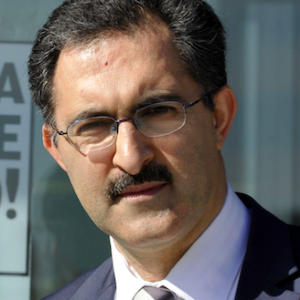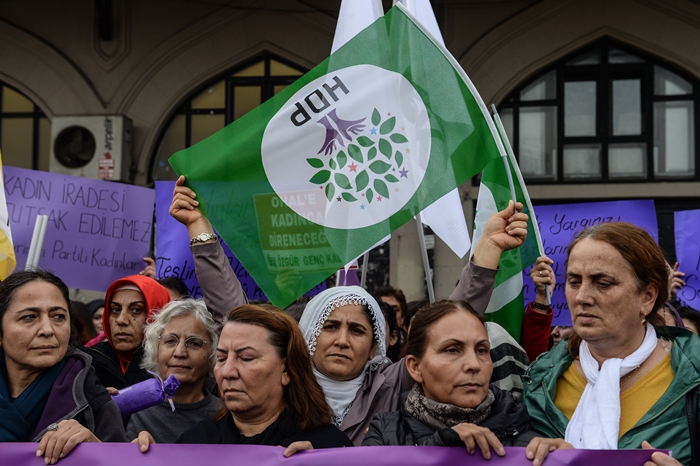By Abdullah Bozkurt
A crackdown on the legitimate Kurdish political movement in Turkey by its autocratic leader Recep Tayyip Erdoğan while provoking militant faction the Kurdistan Workers’ Party (PKK) into terror are tactical moves in the president’s overall strategy of strengthening the radical Turkish Hizbullah (Hezbollah), which is mainly rooted among the country’s conservative Kurdish population.
Erdoğan has been clearing the way for Hizbullah’s surge so that he can secure the allegiance of this extremist group, which draws its strength from the Kurdish population to deliver what he wants, from obtaining an all-powerful imperial presidency to bringing more votes for his Justice and Development Party (AKP) and mobilizing the masses in support of his leadership at crunch time.

For some time Erdoğan had hoped that the Peoples’ Democratic Party (HDP) and its predecessor parties as well as the armed wing of the PKK could have brought him closer to fulfilling his ambitions. He thought that the settlement talks he launched with the PKK in 2012 (without much of a comprehensive plan, by the way) could have driven a wedge between the HDP and the PKK so that he could win over more Kurdish voters. Yet to his surprise, the opposite happened when the HDP increased its votes among Kurds and some Turks, robbing Erdoğan of his dream of becoming Turkey’s first executive president.
Undoubtedly, some of the PKK commanders were troubled with the rise of the legitimate Kurdish political movement, especially its star politician Selahattin Demirtaş, fearing marginalization. In the end Erdoğan dropped the ball, returned to his usual religious-nationalist discourse, provoked the PKK and suspended the peace process altogether.
The jailing of HDP politicians last week including its leaders, coupled with a brutal crackdown in Kurdish cities and towns that are considered to be strongholds of the PKK has provided a golden opportunity for Hizbullah to make further inroads into the Kurdish population. Backed by the Turkish government, endorsed personally by President Erdoğan, Hizbullah has started to draw more recruits, generous funding and unhindered access to government positions. Perhaps using Turkish intelligence assets within the PKK, Erdoğan even staged false flag operations to shift the blame for the shelving of peace talks as suggested by a confidante of Erdoğan’s son-in-law Berat Albayrak that was uncovered in hacked emails.
Turkish Hizbullah, notorious for extrajudicial killings in the Southeast after having been pitted against the PKK terror network by the Turkish state in the late 1990s and early 2000s, was given a facelift in the early years of Erdoğan’s rule starting from 2002, the year Hizbullah decided to end its armed struggle and violence. The move came after security services dealt a heavy blow to Hizbullah, crushed its network, killed its leader Hüseyin Velioğlu in a raid on a safe house in Istanbul and disbanded the organization.
Later the splinter Menzil group formed an association called Solidarity with the Oppressed (Mustazaf-Der in Turkish) in 2003. When the Turkish supreme court upheld a lower court decision in May 2012 that banned the association on the grounds that it acted on behalf of the illegal Hizbullah, the group moved to set up a political party called the Free Cause Party (Hüda-Par) in December 2012.
Erdoğan started to rely more on Hizbullah factions after his falling out with members of Turkey’s leading civic group led by Muslim cleric Fethullah Gülen beginning as early as in 2010 and especially in the aftermath of corruption investigations that rattled the ruling party in December 2013. Members of Hizbullah and its splinter groups were poised to become natural allies for Erdogan, who draws his support from religious zealotry, xenophobia, polarization and division.
The events in Kobani during which the PKK’s Syrian offshoot the Democratic Union Party (PYD) fought a successful battle against the Islamic State in Iraq and the Levant (ISIL) in October 2014 was another turning point that marked the return of violence between the PKK and Hizbullah. Erdoğan and his Islamist associates had taken a position against the PKK, supported Hizbullah and even made clear that they preferred ISIL at the Turkish border to the PKK-affiliated group. Let’s remember that many Kurds from Turkey, especially from Hizbullah’s more radical factions, have joined ISIL and the al-Nusra Front to fight against the Bashar al-Assad government and the Democratic Union Party (PYD) since the Syrian crisis erupted in 2011.
The killing of a 16-year-old Kurdish youngster, Yasin Börü, during the Kobani protests in Diyabakır in October 2014, allegedly by the PKK, on the suspicion that he was an ISIL militant, was repeatedly used by Erdoğan as one of the main themes in election rallies to mobilize Kurds and Turks against the HDP. Börü was a poster boy for the Islamists’ propaganda machinery, while Erdoğan had been unashamedly attacking a grieving Alevi mother who had lost her 14-year-old son, Berkin Elvan, after the teen was hit in the head by a teargas canister deployed by police in the summer 2013 Gezi events. Erdoğan called Elvan a terrorist at rallies and worked the crowds to get them to boo Berkin’s mother, who was already devastated by the terrible loss of her child.
Moreover, Erdoğan enlisted the help of Hizbullah when the AKP lost the majority in the Turkish Parliament in the June 2015 elections for the first time in its 13-year rule and reportedly struck a deal with Hüda-Par, convincing Hizbullah not to field independent candidates but rather to support his favorite AKP in Kurdish regions. Now Hizbullah, with its political party, associations, foundations, media outlets, charity groups and other networks, has been rapidly expanding among Kurds who were pushed away from the HDP after a government crackdown. In the meantime, many Hizbullah members were given key posts in government agencies, especially to fill the void in the bureaucracy after a massive purge of Gülen movement members.
In parallel to Erdoğan’s narrative and policies, Turkish Hizbullah boasts a blend of Salafist radical ideology with Iranian political rhetoric and tactics. Both Saudi Arabia and Iran have invested in this group, hoping to channel the conservative Kurds’ religious yearning to their own political goals so that they can use the group as a proxy for regional ambitions. For example, Iran was the mastermind behind the Hizbullah group’s organization of the second meeting of İttihad’ul Ulema (Union of Islamic Scholars), a Turkish-Kurdish group led by convicted Hezbollah felon Enver Kılıçarslan. The group brought like-minded mullahs from Iran, Iraq, Syria and Turkey to basically promote a polarizing religious discourse with a heavy dose of anti-Western flavor. Kılıçarslan was convicted in February 2012 of membership in the outlawed armed Hizbullah and sentenced to seven years, six months in the Hizbullah trial. He was among 26 suspects sentenced to various prison terms including eight suspects receiving life sentences for murder and armed attacks.
Yet, this convicted felon is free to promote Iran’s revolutionary ideology among Turkey’s Kurds with the blessing of the Erdoğan regime. In the final communiqué at the end of the meeting, it was advised to link up with other religious groups in all four countries, set up a committee to do follow-ups, develop a network of madrasahs with a common curriculum. In a keynote speech, Kılıçarslan revealed that his group has 70 madrasahs with 4,000 students, 400 clerics and more than 300 associations in Turkey. He claimed the bloodshed in the Middle East was caused by Jews and Christians.
Mullah Kılıçarslan is no ordinary figure. He was trained by Iran in Qom between 1989 and 1993 when he was invited by the regime and provided with housing while he stayed there with his wife, Cahide. He has a religious certificate from the Qom Hawza Islamic Sciences Academy. When police raided Hizbullah cells in Istanbul, among the documents seized were Kılıçarslan’s communications with Iran in which he pledged his allegiance to the religious leader, the ayatollah. He wrote that his group is ready to fulfill any task given by Iran and fully obey orders given in that regard. He coordinated with the Iran Revolutionary Guard Corps (IRGC) on how to set up a Hizbullah network in Turkey, starting in areas close to the Iranian border. The president of the government Religious Affairs Directorate (Diyanet), Mehmet Görmez, half Kurdish himself, met with Kılıçarslan in March and talked to him about working together on a religious basis among Kurds in Turkey.
Hizbullah’s other factions such as the one led by Nurettin Şirin, another Iranian asset in Turkey, are also active in Turkey promoting radical religious discourse to youths. Şirin was investigated as part of the probe into the deadly Iran-backed Tevhid-Selam network until early 2014 before Erdoğan intervened to halt the inquiry and sacked prosecutors and police chiefs who were involved in pursuing the criminal investigation of Iran’s clandestine penetration into the Turkish government. Now Hizbullah has been campaigning to secure the release of its convicted members who are still serving jail time, following the government’s decision to let over 30,000 convicts go free in order to make space in prisons for Erdoğan’s critics and opponents who have been rounded up en masse.
The resurgence of Turkish Hizbullah with its bloody past and track record of terror is set to be a major headache for the future security of Turkey and its neighborhood as its aggressive buildup is not checked but rather generously supported by the regime of the country’s top political Islamist Erdoğan, who has proven to be keen in fomenting chaos to sustain its oppressive regime.

